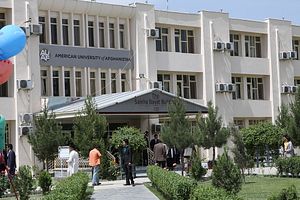The American University of Afghanistan is expected to resume operations Wednesday following the kidnapping of two university faculty members Sunday.
The university confirmed Tuesday in a press release that two members of the faculty were kidnapped at gunpoint on the road outside the university.
University President Dr. Mark English said, “We are devastated by the news and will remain vigilant to ensure the safety and security of all university personnel and students.”
The two kidnapped faculty are believed to be an Australian and an American. Though their nationalities have been confirmed by their countries’ embassies in Kabul, both the embassies and the university have withheld the names of the two people involved out of concern for their privacy and in order to inform next-of-kin.
The two faculty members were reportedly on Darulaman road on the way to their guesthouse Sunday evening when the vehicle they were traveling in was stopped by armed men. According to CNN, citing Afghan security services, “One assailant broke the passenger-side window with his gun and took the two men away. A driver and bodyguard were left unhurt, the official said. The kidnappers were wearing military uniforms, the official said, but not the design and color of the official Afghan army uniform.”
There has been no claim of responsibility for the kidnapping.
Sediq Sediqqi, interior ministry spokesman, told the AFP, “Indications are that they were kidnapped by a criminal group.”
Kidnapping is not uncommon in Afghanistan, though Afghans are usually the target and money a major motivation. Reuters noted that in June, Afghan police advised foreigners in Kabul “that they should travel with guards or avoid leaving their homes.”
In early June, Judith D’Souza, an Indian aid worker, was kidnapped in Kabul. She was rescued at the end of July. No group claimed that kidnapping and security services did not make specific comments on how she was rescued or who had kidnapped her, though the motive was believed to be ransom.
An Australian aid worker snatched in April in Jalalabad remains missing. Katherine Jane Wilson, 60, was kidnapped from the office of the NGO she directs that helps poor women start businesses by armed men in military-style uniforms. Like the other incidents, no group claimed responsibility and the motivation is believed to be monetary.
While many governments warn their citizens against traveling to or working in Afghanistan, the country’s massive development needs have drawn in thousands of foreign aid workers, educators, journalists, and more. Aid agencies, however, have had increasing difficulty in filling posts–a product of the country’s persistent insecurity.
An AFP report last year detailed how international attention shifting to Syria and continued restrictions on the movement of foreign aid workers in Afghanistan–which attempts to ensure security while making their work nearly impossible–had led to fewer and fewer long-term aid workers.
The American University of Afghanistan, which admitted its first class a decade ago, serves more than 1,500 students with an American-style liberal arts education.

































